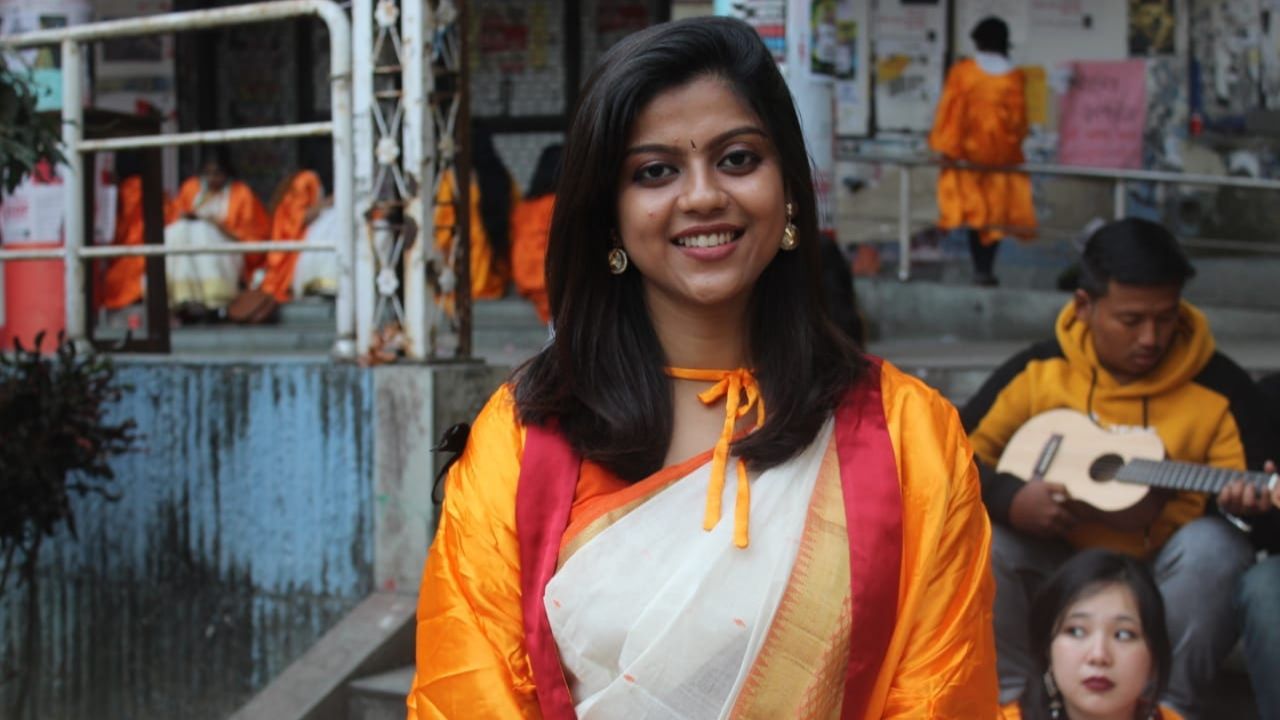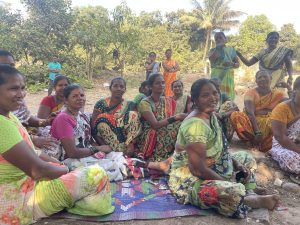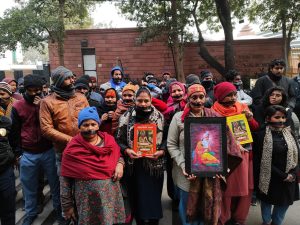Why are Politically Inactive Students Like Me On The Streets?

Debsmita Chaudhury (24) has no regrets. On the contrary, she is quite proud of herself for using the most important platform of her life to stage dissent.
The Jadavpur University gold medallist in Political Science and International Relations used the convocation ceremony on 24th December 2019 to protest against the newly legislated discriminatory and exclusionary Citizenship Amendment Act (CAA). In an act that both surprised her family and professors, Debsmita walked up to the stage and tore apart the copy of the CAA. She then chanted “Inquilab Zindabad” (Long Live Revolution), bowed to the audience and then went on to accept the gold medal from the Vice Chancellor.
“I suppose it is the culmination of rage on the state of affairs in India that has been building up inside me. The anti CAA-NRC protests are an outlet for the anti-people policies of the government thus far”, she told BehanBox.
Women students in universities have used the convocation ceremonies to express explicit dissent against the CAA-NRC. Gold medallists Priya Kurup and S. Mehala from Pondicherry university boycotted the convocation while Rabeeha Abduraheim who was denied entry due to her Hijab (headscarf) in the presence of the President of India refused to accept the medal afterwards.
The Government of India has legislated the Citizenship Amendment Act, 2019 which gives citizenship to persecuted minorities from neighbouring countries excluding Muslims. Additionally, it has announced the implementation of a National Register of Citizens, which demands documents of ancestry for future citizenship. Together these two instruments,as political scientist Professor Niraja Gopal Jayal explains, will lead to radical transformation and exclusion to India’s idea of citizenship.
Government of India’s citizenship measures have seen massive resistance across the country. Women across towns and cities in India have been leading these protests in the universities and outside of it. In the first part of documenting the role of women in the anti CAA and NRC resistance, we spoke with Saima Khan from Shaheen Bagh in New Delhi, where Muslim women have been leading a continuous sit-in for more than a month. In the second part, Tazeen Junaid, a student of Aligarh Muslim University talks about how women students are carrying forward the resistance movement in the face of indefinite closure of the university following police violence.
In this interview with BehanBox, Debsmita Chaudhury of Jadavpur University, who describes herself as an introvert, talks about the reasons for her protest, the sexist trolling and support she received for her act and also why the CAA and NRC are discriminatory measures to establish citizenship.
How did you get the idea to stage the protest at your convocation?
Even until the night before I was undecided as to how I would protest. As students, we were brainstorming on how to protest against the NRC and CAA. Some said wear black clothes, others wanted to boycott the convocation. I was not in favour of boycotting the event for two reasons- JU is already and anti establishment institution and I did not want to deny my degree because I had earned it with hard work despite living with clinical depression. Besides, as a gold medallist, I had extra time so I wanted to use it constructively to dissent. I wish the governor was there to witness the act.
My family was totally unaware as were my professors. My sister saw a white paper in my hand on the day and asked me what it was. I told her it is a paper for protest and nothing more. She asked me if I was doing it alone or with friends. When she saw what I finally did, she was amazed but equally supportive.
You did this in the presence of the Vice Chancellor of Jadavpur University. What was his reaction to this?
I had asked the VC for an extra minute during my turn to receive the medal. I think he was smiling in indirect support because his position would not allow him to oppose in such a direct manner. That’s the beauty of being a student- you have the independence to protest in any way you want without being violent.
Have you always been an overtly political person?
I am actually quite an introvert. In Jadavpur, I was hardly politically active, mostly neck deep in my academics. Since I am from a small town called Bandel in Hooghly district, it took me some time to make friends in Jadavpur University.
So, when I see that convocation video, I am quite surprised at myself. I suppose it is the culmination of rage on the state of affairs in India that has been building up inside me. For the last 2 years, I have been living with clinical depression which made academic life a challenge as well. I wondered whether I should offer my protest on what was one of the biggest moments of my life. In the end, I did not want to throw away the platform I got to register my protest and regret it for the rest of my life. One thing I learned as I struggled with my clinical depression is to live life with courage when I can.
A lot of people saw my act as an emotional outburst and ask me if I have read the CAA. I have read the Act and researched on the NRC and hence I have a well reasoned response to the entire NRC debate.
You talk of culmination of rage on the state of affairs in India. As a student of politics, how do you see the trajectory of India has been taking in the last few years?
From mid 2019, as I began to come to terms with my depression, I started my research work and also a YouTube channel to talk about the state of affairs in the country. This was the time that Babul Supriyo incident at the JU happened and we talked about it.
After that, we started researching on NRC. We went to Assam and Nagaland and met with students union, professors and other members of the public to understand first hand the implications of NRC. We understood how complicated North-East is and NRC in the entirety of India would have economic, political and social consequences. It became clear how it is not just anti-secular but violates international law and standards.
Apart from NRC, we have been frustrated about the new National Education Policy that pushes higher education in India towards gross privatisation and absolute reduction of the central Government’s investment.
Then, there is the question of how the Government treats the students from marginalised communities. Najeeb Jung, a student of JNU disappears one fine day and it does not react. Rohit Vemula, a dalit student is victimised that leads to his institutional murder and government acts in the most awful manner. As an academic scholar, I feel that things are going out of hand because it violates the ideals on which this country was founded.
You said you have been questioned if you have read the CAA. Have you been trolled for your act?
I’m not very active on social media, so in a way I am shielded and my friends do their bit to shield me as well. But yes, I have been trolled. Some have asked me if my gold medal was a result of political influence (laughs).
Then there were sexist comments from trolls about my parents’ character and that people should not give birth to women like me. I definitely think that trolling has been very gendered. When a man does the same thing, like the BHU student who boycotted the convocation, his character is not maligned. When a woman challenges a dominant discourse, like the women from Pondicherry University or Jamia who were shielding their friends from police attacks, our character is the first point of assault.
Some people have called me anti-national but I’m more nationalistic than those people who are supporting CAA because I know the pros and cons of it. I know what it holds for my country.
Even the central Government minister Babul Supriyo trolled me.
Babul Supriyo trolling is not new as he has done it before. How did he troll you, if you do not mind recounting it for us?
Babul Supriyo shared a post by another person that said ‘We should pity Debsmita Chowdhury’s parents for giving birth to such daughters, who are a black stamp on the culture of Bengal’. This post went viral and brought more trolls in my direction. As a minister he should be more cautious. But it fits with their idea of the role of women in the Hindu Rashtra (Hindu nation)- where women should not voice their opinions, confine themselves to the private sphere, as per the ideals spoken in the Manusmriti.
This government’s achievement is that it has forced students like me who are introverts, with no political party affiliations and have never been in protests rallies to come out on the streets. Having said that, I have also received a lot of support from far off places like Sri Lanka, Bangladesh and other countries.
As someone who is now openly protesting, how do you see the current wave of protests and the rise of political consciousness in people?
I think political consciousness is inherent in every person. It just needs time to evolve. And then, in a moment like this as we are seeing now, it erupts. As for me, I have had the privilege of understanding the current scenario because of my university and the professors.
With the people out on the streets, I think, The BJP itself has been instrumental in forming the political consciousness as we see today, because of its own policies. People are educating themselves of the dreadful impact of the policies and those are the voices you hear.
For this, I will applaud the current government for uniting India. I am able to see the intensity of Indian nationalism with the waving of flags and singing songs.
As a student of Political Science and one who has researched the NRC in Assam and Nagaland, how do you see the idea of citizenship evolving under this regime and its exclusionary nature?
The CAA in itself is not as draconian except for the fact that it uses religion to define persecution and excludes many communities, mainly Muslims . Along with the NRC and NPR, it creates disastrous effects. Demanding documented evidence hits the poor most just as demonetisation did.
Secondly, it is unconstitutional and anti-secular, because it violates Article 14 of the Right to Equality of all persons, not just citizens but also Article 29 of religious minorities cultural representation, cultural preservation of all minorities. So you are bringing the minorities to the verge of statelessness.
From the international perspective, it is important to differentiate between refugees and immigrants. In accordance to the international law, refugees are people who are fleeing their country for war or political persecution while immigrants are fleeing their country or moving out of their country in the hope of settling in another country permanently for economic reasons. The CAA provides shelter or citizenship to people of certain religious identities fleeing religious persecution and thus are ‘illegal immigrants’ and not to the refugees.
Those Indian citizens who are not able to qualify the NRC test will be sent to detention camps. A Muslim, in the combination of NRC and CAA, becomes stateless- a person with no political rights. Political rights are a bridge between a person and the other basic rights and entitlements.
How do you read the citizenship measures through various lenses?
You have to see not only the religious perspective but also the other aspects- the labour perspective, gender perspective.Persecution happens on several fronts- religious, social or political, ethnic, cultural and economic persecution. If the government intends to give citizenship on the basis of religious persecution, why not Ahmadiyyas, Pashtuns, Balochs in Pakistan, Rohingyas and Kachin Christian tribes from Myanmar, Christians in Bhutan, Muslims from China or Tamils from Sri Lanka?
If India wants to emerge as a world power, a possible power in South Asia, it has to think in terms of being a leader not only in words but in actions. With this CAA, you downplay your reputation from being a secular world power to a more Islamophobic world power.
In the middle of all this resistance, how are you taking care of your mental health?
I’ve not been able to focus much on my personal health at this time. Right now, I think I have a role to play in this resistance movement, either by joining in the protests or creating awareness material through my Youtube channel.
People think I got the fame but I also got trolls and security risks, as well. At the same time I do not regret my decisions. I think listening to your heart is more important these days. Had I been in more professional spaces, I wouldn’t have been able to take this radical stance. Being a student has helped me take a more radical stand in an effective way.
We believe everyone deserves equal access to accurate news. Support from our readers enables us to keep our journalism open and free for everyone, all over the world.




